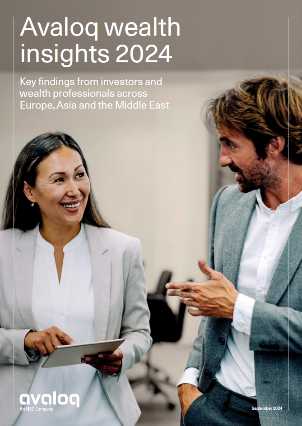What wealthy investors want—and what it means for your next deal
Posted by | Fuld & Company

Data from Avaloq reveals shifting investor expectations, growing tech dissatisfaction among wealth managers, and opportunities for platform modernization—insights that matter to anyone investing in or advising financial firms.
The Avaloq Wealth Insights 2024 report, developed in partnership with Phronesis Partners, is based on surveys with 3,000+ investors and over 300 wealth professionals across Europe, Asia, and the Middle East, reveals major disconnects between what investors expect and how wealth firms deliver. For dealmakers and private equity investors, the findings point to value creation levers—and red flags—across client engagement, platform modernization, and tech-led efficiency.
1. Investor confidence is climbing—but they want control
- 62% of investors manage their own portfolios
- 36% have become more aggressive with their investments
- Only 7% are considering switching institutions—down from 24% in 2023
Investors are increasingly self-directed, but still value expertise—especially when it enhances decision-making, not replaces it. Real estate and equities have surged in popularity, while crypto investments dropped by 12 percentage points.
Key takeaway: Financial institutions with strong advisory and self-service models have an edge. Look for platforms that allow investors to “opt in” to guidance—not enforce it.
2. Advisors still matter—but the bar is higher
- 57% of investors rely on wealth professionals—far more than public figures (29%) or social media (23%)
- Investors now prioritize clarity over responsiveness in communications
- Fast response times dropped in importance—from 35% (2023) to 14% (2024)
Key takeaway: Trust is built on substance. Firms need to enhance the quality of digital conversations—not just speed. Platforms that visualize impact, portfolio risk, and relevant product recommendations in real time are becoming must-haves.
3. Tech is the biggest bottleneck to scale
- 80% of professionals say AI will change their job
- Yet nearly 2/3 say current systems are not fit for purpose
- 59% say systems lack needed functionality
- 44% say data isn’t seamlessly integrated
- 38% cite poor scalability as a barrier to personalization
In every market surveyed, wealth professionals report excessive time spent navigating disjointed systems—most use 4–6 tools daily, while in places like Singapore, it’s 10+. This complexity inhibits onboarding, compliance, and client engagement.
Key takeaway: Consolidation and integration of front-to-back office systems is not just IT hygiene—it’s a driver of productivity and advisory quality. PE and IB teams should evaluate tech architecture during due diligence and consider modern platforms as a path to unlock margin.
4. Asia and the Middle East are leading in digital adoption—and investor aggression
- 34% of investors in Asia and the Middle East report aggressive strategies (vs. 24% in Europe)
- 26% are increasing offshore allocations
- Investors in Hong Kong and the UAE show high openness to AI-driven advice
Professionals in these regions are investing heavily in data analytics, onboarding automation, and real-time dashboards—though scaling personalization remains a challenge.
Key takeaway: Regional growth strategies should account for faster tech adoption and higher client expectations in Asia and the Middle East. Platforms that balance risk management with dynamic engagement will lead.
5. Europe shows appetite for digital, but lags in tech execution
- 76% of European investors haven’t changed their strategy—but only 32% are “very satisfied” with digital experiences
- Professionals cite UI complexity, poor app usage in meetings, and time constraints as key barriers
Markets like Germany show strong ESG interest, while the UK skews toward cash holdings and lags in crypto. Meanwhile, Switzerland leads in demand for automated meeting summaries and compliance checks.
Key takeaway: Firms with better digital CX can take share from incumbents. Invest in platforms that support advisor-led interactions while delivering intuitive, self-directed tools for HNW clients.
6. Younger, digital-native investors will reshape the sector
- Advisors underutilize digital channels—despite investors logging in multiple times per week
- 77% of investors are satisfied with digital experiences overall—a 17-point jump vs. 2023
- But many still seek support for tasks like financial planning, portfolio analysis, and mortgage setup
Key takeaway: Future growth hinges on personalization, visual communication, and omnichannel engagement. Institutions must balance scale with intimacy—something legacy platforms rarely enable.
Final takeaways for dealmakers
For private equity firms and investment banks focused on wealth management, this year’s findings point to key value levers:
Due diligence watchpoints:
- Disconnected tech systems
- Long onboarding timelines
- Lack of AI implementation
- Client churn risk tied to poor digital experience
Value creation opportunities:
- Platform modernization
- Digital advisory enablement
- CX-driven cross-sell/upsell programs
- Regional expansion via scalable infrastructure
Portfolio support strategies:
- Integrate AI to free up advisory time
- Upgrade onboarding and compliance tools
- Invest in UI/UX to enhance client retention and referral
Access the full Avaloq Wealth Insights 2024 report for detailed data, regional analysis, and investor trends across Europe, Asia, and the Middle East: Download the report
Tags: Artificial Intelligence (AI), Business & Industry Research, Data analytics, Disruption, Innovation, Market Insights



















